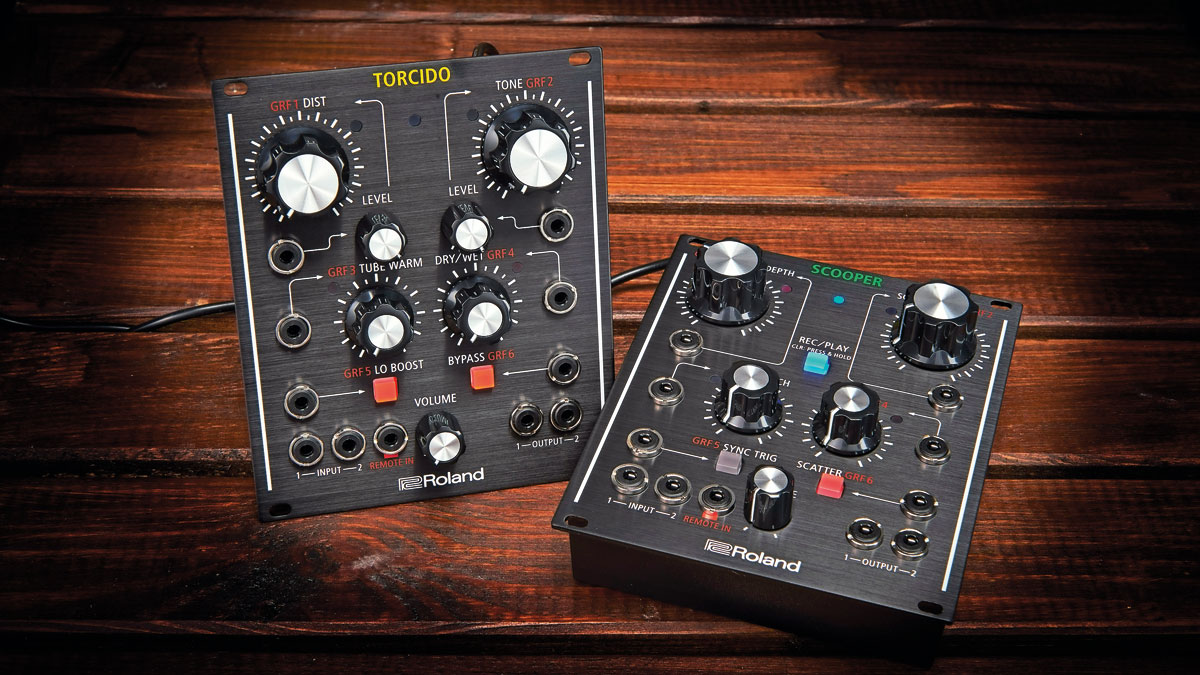MusicRadar Verdict
A small and flexible processor that goes beyond what some simpler units can do.
Pros
- +
Overdub feature.
Cons
- -
Expensive.
MusicRadar's got your back
Roland's Aira onslaught continues, with the company putting out four new effects boxes - the Bitrazer, Demora, Torcido and Scooper.
Today we're running the rule over the Scooper.
As with all other elements in the Aira range, this product utilises digital process (at a sample rate of 96kHz) and comes armed with audio interfacing capabilities courtesy of its USB port.
Like the recent System-1m, the unit also features a plentiful supply of analogue ins and outs that embrace both audio and CV control, and the ability to integrate comfortably into a Eurorack modular system.
The unit's front panel is dominated by two large Moog-style knobs. Next to each is a smaller knob to adjust the amplitude of external CV signals (plugged into the adjacent 3.5mm socket). The associated LED's brightness is used for visual feedback.
A couple of sub-parameters get their own mid-size controls. These can also come under external control, but this time any CV scaling needs to happen before arriving at the unit. Two switches provide simple additional parameter or bypass on/off features, with a couple of mini-jack inputs for Gate control.
Things are rounded off with global Volume, two mono inputs and outputs and the mysterious Remote In.
Want all the hottest music and gear news, reviews, deals, features and more, direct to your inbox? Sign up here.
As with the System-1m this box arrives with its own PSU for desktop use, but you'll also find a Eurorack power connector and four screws for racking. As such, the only connector on the rear is for USB connection to your computer.
As with all other units in the range, this handles both MIDI, audio and system updates. The box itself can also be used for general audio interfacing duties, though once again the 96kHz sample rate is fixed and Roland is not especially clear about what the ten in/out audio ports on your computer are actually routed to.
None of this is explained in the semi-generic two page owner's manual - in fact, nearly everything about using he init is given only a cursory explanation. We understand that digital kit updates often push manuals out of date pretty quickly, but Roland's approach certainly doesn't help you get the best out of a new box of tricks.
Scooper is a decidedly digital effect that takes the Scatter effect found on the TR-8 as its starting point and combines it with an audio looper. The basic workflow consists of capturing an audio loop and then playing it back with rhythmic glitching courtesy of the Scatter engine.
You can adjust the Scatter type and depth, re-pitch the loop and apply low or high-pass filtering. The central button starts recording or playback, but more accuracy can be achieved in tempo critical situations by using the 'Sync Trig' input. One of the custom modules - MIDI Clock To Gate - can also be useful here.
The latest update adds an overdub feature, but this doesn't get away from the fact that only what is recorded gets processed. A fully live glitch/scatter processor would perhaps have been more useful for some.
